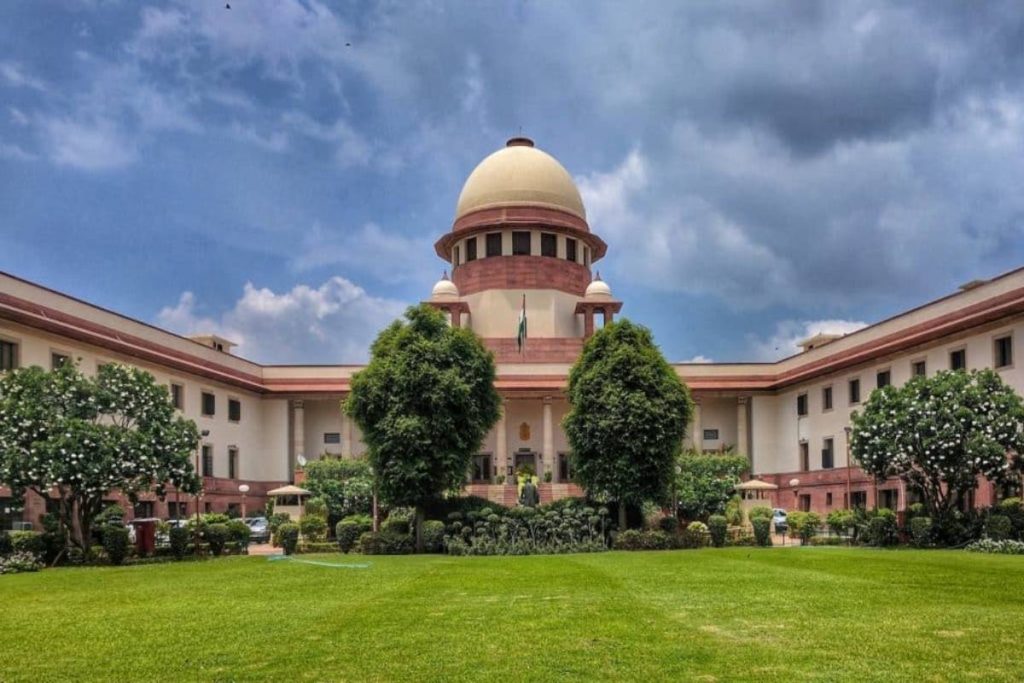The Supreme Court has intervened to stop the Enforcement Directorate’s ongoing investigation into the Tamil Nadu State Marketing Corporation (TASMAC), issuing a stay on all related proceedings and criticising the central agency for overstepping its authority.
The top court’s move came after the Tamil Nadu government, led by the DMK, approached it with a plea against an earlier decision by the Madras High Court which had allowed ED raids and investigations under the Prevention of Money Laundering Act, 2002.
During the hearing, Chief Justice of India BR Gavai, heading the bench with Justice AG Masih, questioned the ED’s authority to initiate proceedings against a government-owned company. “You may register cases against individuals… but corporations? Your ED is passing all limits!” he remarked. The court emphasised that law and order fall under state jurisdiction and accused the ED of “violating the federal structure.”
Tamil Nadu’s main argument was that the central agency had no basis to target TASMAC without establishing a clear predicate offence the underlying crime that triggers a money laundering probe. “Where is the predicate offence?” the bench asked, expressing concern over the legality of ED’s actions.
ED Alleges TASMAC Involvement in Rs 1000 Crore Scam
The case centers on ED allegations that TASMAC was involved in a Rs 1,000 crore scam, involving manipulation in bar licensing, liquor supply tenders, and financial dealings with distilleries and bottle manufacturers. The ED has claimed that unaccounted cash was distributed to secure liquor orders and that data recovered during searches included evidence of “fraudulent pricing” and biased tender awards.
TASMAC, however, denied these allegations and pointed out that Tamil Nadu’s Directorate of Vigilance and Anti-Corruption had already filed 41 FIRs between 2014 and 2021 against various individuals. The state asserted that the ED’s ongoing probe was unwarranted and politically driven.
Senior advocates Kapil Sibal and Mukul Rohatgi, representing TASMAC and state officials, raised serious concerns about the ED’s methods. “There is something called privacy,” Rohatgi said, as he and Sibal informed the court that the ED had seized and cloned personal mobile phones and electronic devices without following due legal process.
In earlier raids conducted on March 14 and May 16, the ED had entered TASMAC offices and confiscated personal belongings of staff, including women employees, detaining some of them for extended periods. The Tamil Nadu government described the actions as harassment and a breach of constitutional rights.
S. Muthusamy Blames ED of Having Political Vendetta
Excise Minister S. Muthusamy accused the ED of acting with “political vendetta,” stating that the agency was misusing its powers to tarnish the state government’s image ahead of upcoming elections. He added, “The ED has found no proof to substantiate the alleged irregularities.”
Previously, on April 4, Tamil Nadu had attempted to transfer the case from the Madras High Court to another court outside the state, alleging judicial bias, but later withdrew the petition. The High Court had criticised the move, accusing the state of “forum shopping.”
The Supreme Court’s latest stay comes after the Madras High Court’s April 23 decision allowed the ED to continue its investigation, which the state subsequently challenged in its Special Leave Petition. The court has now issued a notice to the ED and stayed any further proceedings until after its summer vacation.
The ruling has drawn a positive response from DMK leaders. Former Rajya Sabha MP R.S. Bharathi told PTI that the court’s order was “a blow to the BJP’s efforts to malign the state government.”
BJP leader K. Annamalai Calls V. Senthil Balaji Kingpin
Meanwhile, BJP leader K. Annamalai targetted Tamil Nadu minister V. Senthil Balaji, calling him the “kingpin” of the alleged scam. “I have my sources. I believe (the corruption) is over Rs 1,000 crore. Senthil Balaji is involved in every single scam. He is the kingpin. Supreme Court has questioned (him).” he claimed.
Balaji has denied all allegations, defending the transparency of TASMAC operations. “Everything is transparent as far as TASMAC is concerned. As far as purchase is concerned… it would be done by calculating the average of the last three months of purchase brand. By taking the average of the last three years and the last month’s purchase, TASMAC will give a purchase order. So, we have not shown any discount to anyone on giving purchase orders,” he explained.
This Supreme Court action reflects growing concern over the use of central agencies in state matters and sets the stage for a broader debate on federalism, due process, and political neutrality in enforcement actions.


